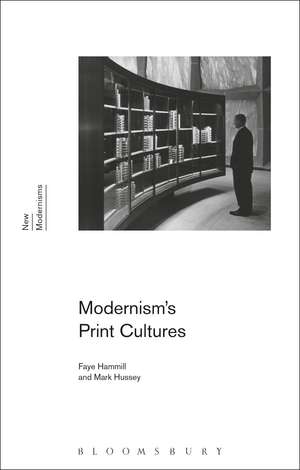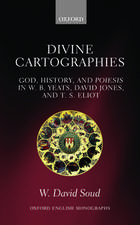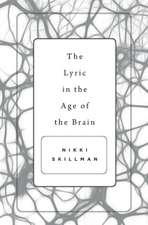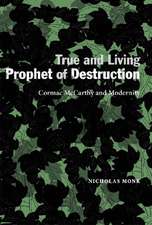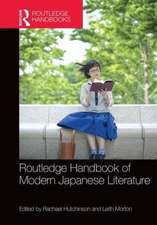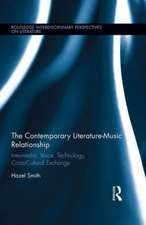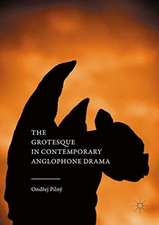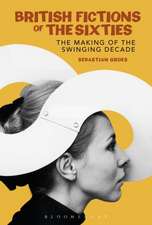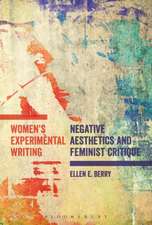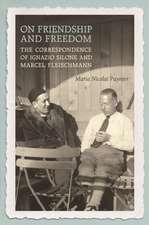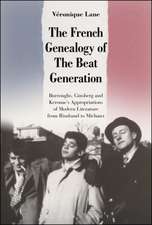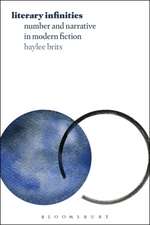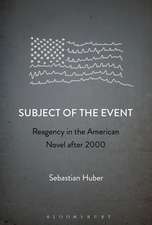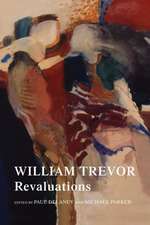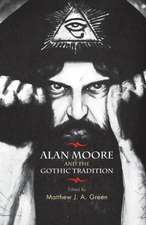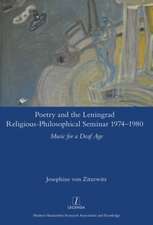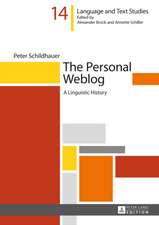Modernism's Print Cultures: New Modernisms
Autor Professor Faye Hammill, Professor Mark Husseyen Limba Engleză Paperback – 24 aug 2016
| Toate formatele și edițiile | Preț | Express |
|---|---|---|
| Paperback (1) | 178.55 lei 6-8 săpt. | |
| Bloomsbury Publishing – 24 aug 2016 | 178.55 lei 6-8 săpt. | |
| Hardback (1) | 567.25 lei 6-8 săpt. | |
| Bloomsbury Publishing – 24 aug 2016 | 567.25 lei 6-8 săpt. |
Preț: 178.55 lei
Preț vechi: 207.45 lei
-14% Nou
Puncte Express: 268
Preț estimativ în valută:
34.16€ • 35.67$ • 28.28£
34.16€ • 35.67$ • 28.28£
Carte tipărită la comandă
Livrare economică 04-18 aprilie
Preluare comenzi: 021 569.72.76
Specificații
ISBN-13: 9781472573254
ISBN-10: 1472573250
Pagini: 232
Dimensiuni: 138 x 216 x 19 mm
Greutate: 0.34 kg
Editura: Bloomsbury Publishing
Colecția Bloomsbury Academic
Seria New Modernisms
Locul publicării:London, United Kingdom
ISBN-10: 1472573250
Pagini: 232
Dimensiuni: 138 x 216 x 19 mm
Greutate: 0.34 kg
Editura: Bloomsbury Publishing
Colecția Bloomsbury Academic
Seria New Modernisms
Locul publicării:London, United Kingdom
Caracteristici
Surveys key critical work on this major topic, with annotated guides to further reading and guidance on using electronic resources
Notă biografică
Faye Hammill is Professor of English at the University of Strathclyde, UK. Her most recent books are Magazines, Travel and Middlebrow Culture (2015), with Michelle Smith, and Sophistication: A Literary and Cultural History (2010), winner of the European Society for the Study of English book award.Mark Hussey is Distinguished Professor of English at Pace University, USA. He is editor of the Cambridge edition of Virginia Woolf's Between the Acts (2011) and edits Woolf Studies Annual.
Cuprins
Introduction1. Sensual Print2. Print in Circulation3. Print, Politics and AudiencesConclusionBibliographySuggested ReadingIndex
Recenzii
An exemplary book . Modernism's Print Cultures maintains these high standards and is the best single introduction to the newish field of modernism's complex engagement with book history, periodical studies, and various other forms of printed materials: it is impressive in its coverage and authoritative in its judgments . If you wish to learn more of how the field of print culture studies is transforming the study ofmodernism, this book is the place to start.
Hammill (Univ. of Strathclyde, UK) and Hussey (Pace Univ.) survey the wide range of scholarly work produced during the past 25 years that has examined and analyzed literary modernism from the perspective of print culture. The focus on print culture is reflected in the subjects covered: chapter 1 looks at scholarly publications about "the physical and visual aspects of modernist printed objects," chapter 2 examines publications about "the circulation of those objects in the marketplace," and chapter 3 deals with publications about "the political and educational dimensions of print enterprises." . [F]or those already familiar with modernist studies, this valuable, nonevaluative survey highlights certain trends in scholarship (especially the increasing interest in modernism in periodicals and in regarding all literary publications as collaboratively produced) and calls attention to the many publications, websites, and so forth that can inform future scholarly research. Summing Up: Recommended. Graduate students, researchers, faculty.
Hammill and Hussey move methodically through the history of book history and periodical studies since modernism's infancy, arguing that "it is possible to trace an almost continuous attention to the issues and questions addressed by the term 'print culture' from the late nineteenth century . . . to now" (24). Their task is to demonstrate how the attention paid to modernist print culture in the twenty-first century has illuminated the fact that the debates and insights of our contemporary critical practice are precisely those than animated writers, editors, publishers, and readers more than a hundred years earlier. At this they succeed with real distinction, devoting substantial chapters to the modernist book (and magazine) as a physical object, the circulation of modernist print, and the social life of politically oriented publications. Throughout, they are commanding and lucid, detailing a robust archive while at the same time attending to how critical engagements with that archive continue to rewrite the story of modernist studies.
Hammill (Univ. of Strathclyde, UK) and Hussey (Pace Univ.) survey the wide range of scholarly work produced during the past 25 years that has examined and analyzed literary modernism from the perspective of print culture. The focus on print culture is reflected in the subjects covered: chapter 1 looks at scholarly publications about "the physical and visual aspects of modernist printed objects," chapter 2 examines publications about "the circulation of those objects in the marketplace," and chapter 3 deals with publications about "the political and educational dimensions of print enterprises." . [F]or those already familiar with modernist studies, this valuable, nonevaluative survey highlights certain trends in scholarship (especially the increasing interest in modernism in periodicals and in regarding all literary publications as collaboratively produced) and calls attention to the many publications, websites, and so forth that can inform future scholarly research. Summing Up: Recommended. Graduate students, researchers, faculty.
Hammill and Hussey move methodically through the history of book history and periodical studies since modernism's infancy, arguing that "it is possible to trace an almost continuous attention to the issues and questions addressed by the term 'print culture' from the late nineteenth century . . . to now" (24). Their task is to demonstrate how the attention paid to modernist print culture in the twenty-first century has illuminated the fact that the debates and insights of our contemporary critical practice are precisely those than animated writers, editors, publishers, and readers more than a hundred years earlier. At this they succeed with real distinction, devoting substantial chapters to the modernist book (and magazine) as a physical object, the circulation of modernist print, and the social life of politically oriented publications. Throughout, they are commanding and lucid, detailing a robust archive while at the same time attending to how critical engagements with that archive continue to rewrite the story of modernist studies.
